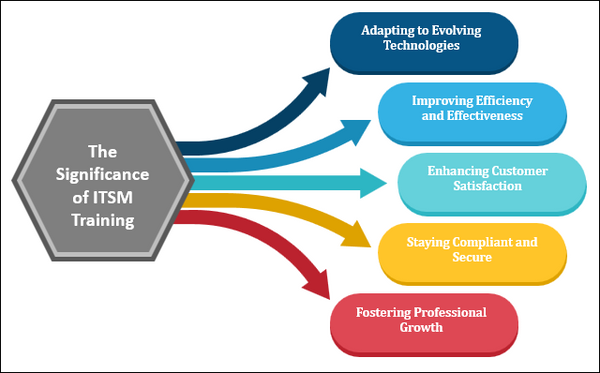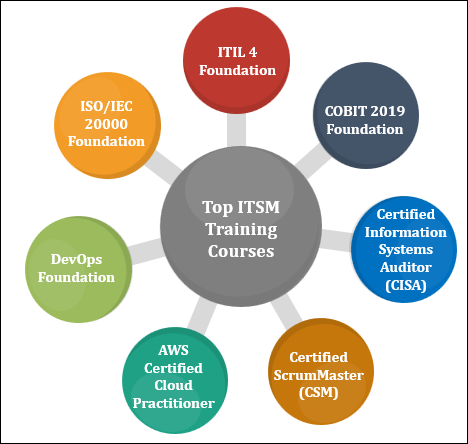ITSM TRAINING COURSES
In today's digital age, Information Technology Service Management (ITSM) has become a cornerstone of efficient and effective IT operations. ITSM encompasses a set of practices and tools designed to align IT services with the needs of the business, ensuring optimal performance, cost-efficiency, and customer satisfaction.

To excel in the field of ITSM, professionals must continuously enhance their knowledge and skills through specialized training courses. This article explores the significance of ITSM training, the key components of a comprehensive training program, and some of the top ITSM training courses available today.
The Significance of ITSM Training
In an era where technology permeates every facet of business and daily life, ITSM training holds paramount importance for several compelling reasons:
Adapting to Evolving Technologies:
ITSM is not a static field; it evolves in tandem with technological advancements. IT professionals must remain updated with the latest trends, tools, and methodologies in ITSM to stay relevant and valuable to their organizations. Training courses provide a structured and efficient way to learn about emerging technologies such as artificial intelligence (AI), machine learning, and automation, and how to seamlessly integrate them into existing ITSM practices.
Improving Efficiency and Effectiveness:
Well-trained ITSM professionals play a pivotal role in streamlining IT operations, reducing downtime, and minimizing service disruptions. Through training, IT professionals gain a deeper understanding of best practices, enabling them to identify and resolve issues faster and more effectively. This translates into cost savings, increased productivity, and improved customer experiences.
Enhancing Customer Satisfaction:
At its core, ITSM is about providing excellent service to end-users. Training courses often include modules on customer service, helping IT professionals develop the skills needed to understand and meet user needs, ultimately increasing customer satisfaction. Satisfied customers are more likely to be loyal and advocate for the organization.
Staying Compliant and Secure:
ITSM is closely tied to compliance and security requirements. Training courses often cover compliance standards such as GDPR, HIPAA, or industry-specific regulations. Additionally, they delve into security best practices, ensuring that IT professionals can help their organizations meet regulatory requirements and protect sensitive data, a critical aspect in an era of increasing cyber threats.
Fostering Professional Growth:
ITSM training courses provide a pathway for career development and growth. Achieving certifications and gaining expertise through training can lead to better job prospects, increased earning potential, and opportunities for leadership roles within IT organizations.
Key Components of ITSM Training
A comprehensive ITSM training program should encompass various key components to provide a well-rounded education for IT professionals. Here are some essential elements that should be included:
Fundamentals of ITSM:
Training courses should start with an introduction to ITSM concepts, principles, and frameworks. This includes foundational knowledge about widely adopted frameworks such as ITIL (Information Technology Infrastructure Library), COBIT (Control Objectives for Information and Related Technologies), and ISO/IEC 20000. A solid understanding of these frameworks forms the basis for effective ITSM practices.
Service Strategy and Design:
Courses should delve into the intricacies of IT service strategy, design, and planning. Professionals should learn how to align IT services with business objectives and create efficient service processes that not only meet but exceed customer expectations.
Service Transition and Operation:
ITSM training should cover the practical aspects of service transition and operation. This includes topics such as change management, incident management, problem management, and service desk operations. Understanding these elements ensures the smooth operation of IT services and minimizes disruptions.
Continual Service Improvement (CSI):
Professionals should be well-versed in measuring, monitoring, and continually improving IT services through CSI practices. This involves the establishment of Key Performance Indicators (KPIs), metrics, and strategies for performance optimization. Continual service improvement is essential for aligning IT services with evolving business needs.
IT Governance and Compliance:
An important aspect of ITSM training is understanding IT governance frameworks and compliance standards relevant to the organization. This knowledge equips IT professionals with the tools to navigate the complex landscape of regulations and ensure that the IT infrastructure complies with legal requirements and industry standards.
Emerging Technologies:
To stay current and competitive, ITSM training should include modules on emerging technologies transforming the IT landscape. Topics such as artificial intelligence (AI), machine learning, automation, cloud computing, and the Internet of Things (IoT) should be explored in depth. Professionals must understand how these technologies can be harnessed to enhance ITSM practices and deliver more agile and efficient services.

Top ITSM Training Courses
Many ITSM training courses are available, catering to diverse interests and specialization areas. Here are some of the top ITSM training courses that IT professionals can consider:
ITIL 4 Foundation:
ITIL is one of the most widely recognized ITSM frameworks globally. The ITIL 4 Foundation course comprehensively introduces ITIL principles and practices, enabling professionals to implement ITSM effectively within their organizations. ITIL 4 has been updated to align with modern practices and technologies.
COBIT 2019 Foundation:
COBIT is another prominent framework for IT governance and management. The COBIT 2019 Foundation course covers governance and management best practices, ensuring compliance, risk management, and efficient IT operations. This certification is especially valuable for professionals involved in risk and compliance management.
Certified Information Systems Auditor (CISA):
CISA certification is ideal for IT professionals specializing in IT audit, control, and assurance. This course provides a deep dive into auditing, control, risk management, and governance aspects of ITSM. CISA-certified professionals are highly sought after for their expertise in ensuring the security and integrity of IT systems.
Certified ScrumMaster (CSM):
While Scrum is primarily associated with software development, its principles can be applied to ITSM. The Certified ScrumMaster (CSM) certification teaches agile and Scrum methodologies for IT service delivery. Agile practices emphasize collaboration, adaptability, and customer-centricity, aligning with the goals of ITSM.
AWS Certified Cloud Practitioner:
As cloud computing plays a significant role in modern ITSM, the AWS Certified Cloud Practitioner certification is valuable for professionals working with cloud-based services. This course covers the fundamentals of AWS cloud technologies, preparing individuals to effectively manage cloud resources and services.
DevOps Foundation:
DevOps practices promote collaboration between development and IT operations, aligning with ITSM goals. The DevOps Foundation course introduces the principles and practices of DevOps, emphasizing automation, continuous integration, and continuous delivery (CI/CD). This certification is particularly relevant for professionals seeking to bridge the gap between development and operations.
ISO/IEC 20000 Foundation:
ISO/IEC 20000 is an international standard for IT service management. The ISO/IEC 20000 Foundation course provides a comprehensive understanding of the standard and its application in ITSM. Professionals pursuing this certification gain insights into international best practices and compliance requirements, making them well-equipped to drive excellence in IT service management.
Conclusion
ITSM training courses are beneficial and imperative for IT professionals seeking to excel in their careers and provide significant value to their organizations. These courses empower individuals to adapt to evolving technologies, improve operational efficiency, enhance customer satisfaction, ensure compliance and security, and foster their professional growth. These courses offer a comprehensive and multifaceted education by covering the fundamentals of ITSM, service strategy and design, service transition and operation, continual service improvement, IT governance, and emerging technologies.
The choice of an ITSM training course depends on individual career goals, organizational needs, and the specific ITSM framework or specialization area of interest. As technology continues to evolve, so must the knowledge and skills of IT professionals. ITSM training courses are the gateway to staying at the forefront of this ever-changing field.






